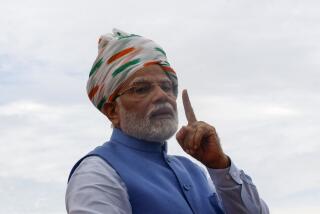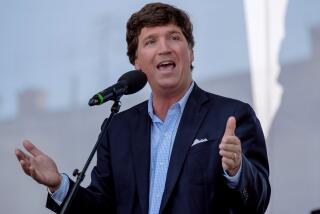TV’S IMPACT: PART OF A BIGGER PICTURE : Decisions by the Powers Behind the Screen Affect Everyone--From Santa Claus to Terrorists to Pregnant Women : BBC ACTION DRAWS U.S. CRITICISM
- Share via
British Broadcasting Corp. journalists were striking today to protest the BBC’s cancellation--at the government’s request--of “At the Edge of the Union,” a documentary about extremism in Northern Ireland. The program in part profiles an alleged leader of the outlawed Irish Republican Army.
Prime Minister Margaret Thatcher, who has urged journalists to deny “terrorists the oxygen of publicity,” has rejected accusations of government censorship, and the BBC’s governors reject charges that they caved in to government pressure.
But the BBC action has drawn sharp criticism both in England and here, the latter most notably in a commentary last week by John Chancellor on “The NBC Nightly News,” in which Chancellor said in part:
“When the government got the program canceled, the right of the British people to think for themselves was damaged.”
Could what happened in England happen here? Could the U.S. government ask the three major commercial television networks not to air a particular story or news program?
It has happened on rare occasions, according to past and present network news executives interviewed this week. But they could recall only two such instances, and said that in each case the request ultimately went unheeded.
The stories involved a reported CIA attempt in 1974 to raise portions of a sunken Soviet submarine from the floor of the Pacific Ocean, and an NBC documentary in 1962 about the building of a secret escape tunnel from East Berlin to West Berlin.
Whether the Reagan Administration ever would attempt what the Thatcher government has done “is hard to know,” said Richard C. Wald, executive vice president of ABC News. But it’s unlikely, he said, “because the tradition in this country of the government keeping hands off (of the press) is so strong.
“I cannot see an American government doing the same thing,” he said, referring to the British government’s request that precipitated the one-day protest strike by BBC journalists.
“That kind of thing (cancellation request), to my knowledge, doesn’t happen here,” said former NBC News correspondent Elie Abel, now chairman of Stanford University’s communications department. The basic reason, he said, “is that the U.S. culture basically says ‘the hell with this kind of thing.”’
Former CBS News President Richard S. Salant echoed that sentiment, but wryly added, “It all depends on whether Reagan is listening to Thatcher . . . or to reason.”
Both Salant and Reuven Frank, the latter a former NBC News president who produced NBC’s Emmy-winning Berlin documentary, agreed that in addition to the strong American tradition of a free press, the news operations of CBS, NBC and ABC are fortunate in another major respect: Advertising revenues pay their way.
In contrast, the BBC, although independent of government control, is financed by a license fee levied on television set users that is fixed and collected by the state.
And that, Salant said, “is one of the soft underbellies” of the BBC.
(Public TV stations in the United States now get about 18% of their funding from federal sources, according to a spokeswoman for the Public Broadcasting Service. But she said that to the best of her knowledge PBS never has been asked by the government to cancel a news program, “and as a general policy we would resist such pressure.”)
Frank, now a senior producer at NBC News, said he doubted that the success of the Thatcher government in getting the BBC documentary canceled would embolden the Reagan Administration to someday also ask a U.S. network to cancel a story or program with which it found fault.
“I think the White House is shrewder than that,” he said.
The BBC announced its controversial cancellation on July 30. At that time, Will Wyatt, head of the BBC’s documentaries section, defended the program as “careful, thoughtful and informative” and “not supportive of terrorists.”
Leon Brittan, who as Britain’s Home Secretary is responsible both for law and order and for broadcasting, said then that he had not seen the program. But he said press reports suggested that it gave “spurious legitimacy to the use of violence for political ends” and that to air the documentary would be contrary to the national interest.
“I think it’s very bad,” Frank said of the BBC’s program cancellation. However, he added, the action doesn’t necessarily cause irreparable harm to the BBC’s long tradition of journalistic independence.
“I suspect they’ll be able to recover--unless it happens again in the next couple of years,” he said. “If that happens again, the BBC’s international reputation will be in a shambles.”
More to Read
The complete guide to home viewing
Get Screen Gab for everything about the TV shows and streaming movies everyone’s talking about.
You may occasionally receive promotional content from the Los Angeles Times.






